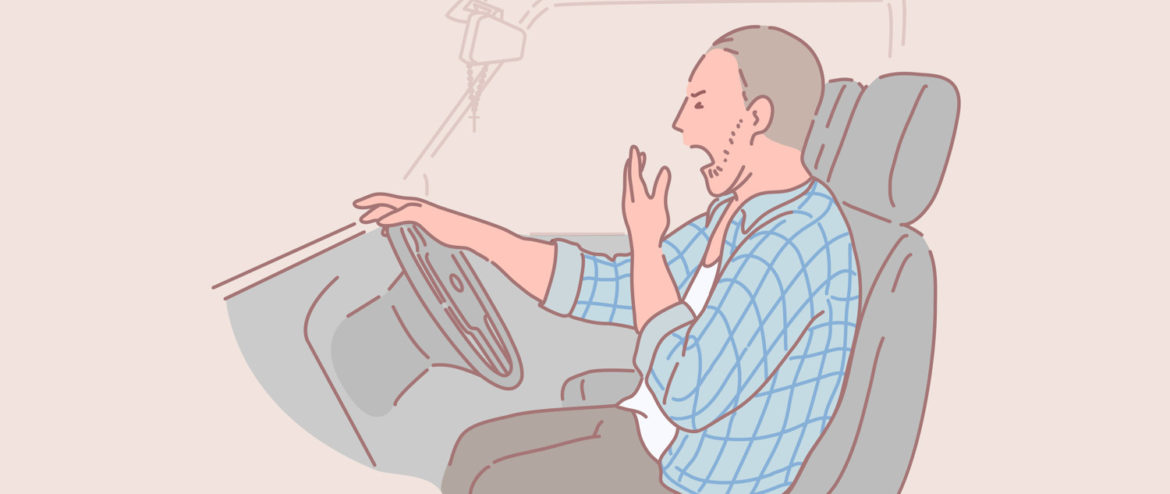If you’re a truck driver or any other kind of commercial driver, you’re probably no stranger to drowsy driving.
Unfortunately, fatigue is a major contributor to accidents involving commercial vehicles. One study conducted by the Federal Motor Carrier Safety Administration and the National Highway Traffic Safety Administration revealed that drowsy driving was behind 13% of accidents involving large commercial vehicles.
When it comes to truck driving, it seems like battling fatigue is an inevitable part of the job. The industry runs 24/7, as does everyone along the supply chain. That means drivers can expect to be unloading at 3 am one day, only to be making deliveries at 10 am the following day. Erratic schedules might be part and parcel of the job – making getting enough sleep a real challenge. Still, there are several ways drivers can get the sleep they need and stay alert while driving. Since safety is a priority at Argus, we train our long-haul drivers with science-backed best practices for sleep. Here’s what we advise our drivers to do.
Take regulations seriously
Each country, province, and state has laws regarding the number of hours a commercial driver can work. Argus drivers undergo supervised training and ongoing reviews in order to ensure they understand the laws in depth. In full compliance with The Société de l’assurance automobile du Québec, Argus safety training is crucial for keeping both drivers and the public safe. Hours of service (HOS) are tracked electronically, but drivers still have the responsibility of managing their time driving and when they take breaks to sleep.
Keeping in mind that regulatory controls alone cannot eliminate the risk of accidents due to fatigue, see the following rules for staying alert while driving.
Stay on top your health (regularly)
For many drivers, falling asleep at will can be difficult when working irregular hours. There are several factors that lead to good sleep – overall health key being a key one. Seeing a doctor regularly and following their advice is essential, especially if they suspect you have sleep apnea or any other serious condition. Even drivers in good health should include exercise in their daily regimen when possible, and even more importantly, eat healthily. It might sound obvious, but eating well and staying fit are critical for truck drivers even if (or perhaps, because) the nature of their work is mostly sedentary.
Create a better sleeper berth atmosphere
It might be tempting to scroll on your phone and catch up with loved ones during break time, but the light from mobile phones has been proven to inhibit sleep.
For truck drivers that need to take a nap, make sure the sleeper cab or sleep area is conducive to good quality shut eye. This would include making sure it is dark, on the cool side, and quiet. Noise-cancelling headphones or earplugs can be life savers! Some drivers even invest in a mattress topper or some kind of padding to make the area more comfortable. Remember, if you only have a short break and need to sleep, make sure your area is prepared for a peaceful nap – and put the mobile phone away.
Make your time off count
Recent studies conclude that most adults need 7 to 9 hours
There has been some debate around how many hours of sleep an average adult needs per night. Well, the verdict is in, and recent studies conclude that most adults need 7 to 9 hours. Whether you’re driving during daytime hours or getting your km’s in at night, getting enough sleep before you start your shift should be a top priority. During your time off, it can be tempting to stay awake in order to spend as much time with your loved ones as possible; sometimes, the demands of family means there’s simply no time to sleep. Over time, however, lack of sleep can create an overall sleep deficit, and your body will try to get sleep whenever it can – unfortunately, that can happen while driving. Along with the rest of your personal life and all of the responsibilities that come with it, make sleep a priority.
Stay awake the healthy way
Many drivers are known to consume heavily caffeinated beverages, energy drinks, and sugary snacks to stay awake. These might give you a rush momentarily, but tend to lead to a serious crash a short time later. Caffeine can sometimes be a good solution to drowsiness, but loading up on healthier snacks is usually a better way to keep blood sugars stable. Easy on-the-go snacks could include pre-packed raw vegetables, almonds, trail mix, and sandwiches made with whole grain bread. Note that healthy food promotes a longer and deeper sleep when you finally get the chance to rest your eyes properly.
Above all, drivers must learn to recognize the symptoms of fatigue such as frequent yawning, fluttering eyelids, involuntary lane changes, delayed braking, inconsistent speed, and more. When drowsy, the best course of action is not to crack open a caffeinated drink, but to pull over to a safe location to rest. Delivering a shipment successfully is important, but health and safety take precedence at all times.


